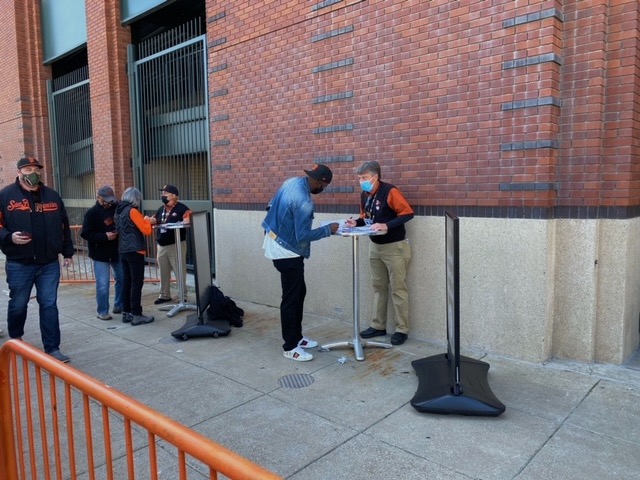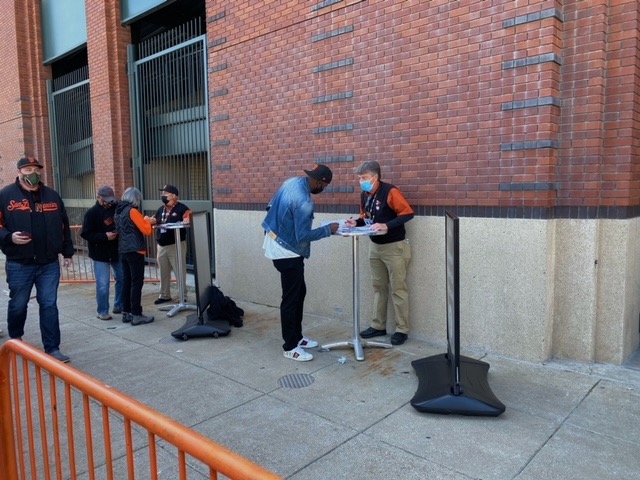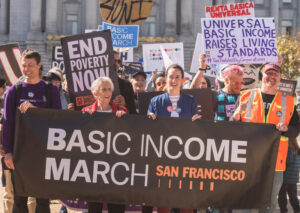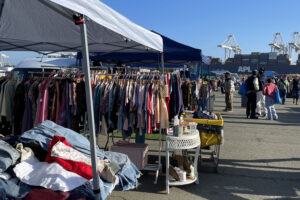
Photo courtesy of Yeshayah Goldfarb
The San Francisco Giants opened up their stadium on Friday, April 9, to fans who could provide proof of vaccination or evidence of a recent negative COVID-19 test. The fairly new concept of a vaccine passport, or documents that would grant the holder access to indoor spaces and events, has spread across the globe and has been embraced in Israel, the European Union and New York.
Various local events and businesses in the Bay Area are following this path and requiring proof of vaccination to enter. Yeshayah Goldfarb, the Vice President of Baseball Resources & Development for the Giants, acknowledged that the Giants requiring proof of vaccination or negative COVID test is comparable to requiring a vaccine passport. “Everyone’s bringing their card, and they have to show that they’ve been fully vaccinated with the card as their proof,” Goldfarb said. “That’s kind of similar to a passport to get into the stadium.”
A vaccine passport protects all those attending large gatherings and thus reduces the danger of super spreader events. On the other hand, introducing a vaccine passport before the vaccine becomes more accessible raises a number of ethical concerns and questions. Those who have not had access to the vaccine are precluded from attending an event or entering an area.
The official vaccine passports of Israel and New York are both accessed by an app — Israel’s “Green Passport” and New York’s “Excelsior Pass” permit access to sporting events, performances and other activities. In Israel, certain gyms, theaters, hotels, concerts and synagogues also require a Green Passport. As the vaccine is becoming more available, it would make sense that these events would be open to those who are protected from the disease.
In Israel, the idea is that there would also be a small number of places open to everyone, vaccinated or not, and the number of these places would grow as herd immunity does, according to the Jerusalem Post. The passport can be considered to be a ticket back to normalcy, making crowded places safer and encouraging more people to get vaccinated.
Right now in California, many independent events are requiring their own proof of vaccination or a negative test, but so far, there isn’t one unified app that grants access to all spaces.
White House Press Secretary Jen Psaki announced in a briefing on April 6 that there wouldn’t be a federal vaccination database because of individuals’ privacy rights, meaning that there will not be an official vaccine passport for everyone in the United States. But, she added, the idea is being considered by private and nonprofit sectors.
When asked about the possibility of an official vaccine passport in San Francisco, the San Francisco Department of Public Health (SFDPH) said, “We are tracking this concept to more fully understand its benefits and challenges, and we will continue to monitor guidance set forth by the State and CDC that may influence our thinking around such a concept. We are looking into areas where this could be useful and, in particular, where larger numbers of people are coming together.”
Indoor live ticketed events were able to begin in San Francisco on April 15 — as long as all attendees provide proof of vaccination or a negative COVID-19 test.
COVID-19 cases in some countries and in parts of the United States are again on the rise. Many locations in the San Francisco Bay Area are beginning to open up again, and if these places don’t certify a person’s immunity before entering, there is a good chance that even more people could become infected.
Some are against a vaccine passport because they are concerned about the privacy risks related to having to carry an identification card with medical history.
However, Los Angeles Times columnist and San Francisco native Doyle McManus dismissed this concern in an article published on April 11, saying that “If you’re a user of Facebook, Amazon or Uber, you’ve already given those companies far more data than that.”
Another concern is that only those with smartphones would be able to access the app and therefore obtain a vaccine passport. Both the Green Passport and Excelsior Pass can also be printed out in physical copy, and if San Francisco introduced a vaccine passport it is likely they would follow this format.
There are other clear drawbacks of introducing a vaccine passport. It might make sense that large events like concerts or Giants games should require proof of vaccination in order to keep participants safe. However, if a vaccine passport like Israel’s is required to visit hotels, grocery stores or places of worship, those without easy access to the vaccine could be left behind. Israel is able to create a vaccine passport because they are getting vaccines administered at an extremely fast rate — if San Francisco wanted to do the same, the focus needs to first be on vaccine accessibility.
The CDC released a report a month ago exhibiting the distribution of county-level COVID-19 vaccinations by state and “social vulnerability,” ranking California as the 44th state in the country. California created an equity plan that included setting aside 40% of vaccines for vulnerable communities, a great first step, however, the vaccine prioritization formula largely left out places in the Bay Area that were hit the hardest by COVID-19.
Out of the 400 ZIP Codes the plan covers, the Bay Area only has ten included within the equity plan, even though the Bay Area accounts for 20% of the population of California, according to the San Francisco Chronicle. A major concern for vaccine passports before vaccinations become more accessible is that an additional divide between the most vulnerable and privileged populations in the Bay Area could become apparent.
Since the report was released, vaccinations have become more available in California, as everyone over the age of 16 is now eligible. However, getting an appointment for the vaccine is still difficult for many.
“Health officials in many cities say that people from wealthier, largely white neighborhoods have been flooding vaccination appointment systems and taking an outsized share of the limited supply,” according to the New York Times. This means that although 40% of vaccinations have been set aside for disproportionately affected communities in California, the people living in them aren’t necessarily the ones receiving the vaccine.
Vaccine passports (or other forms of testing or proof of vaccination) are crucial to the reopening of the Bay Area because they help to ensure the process is done safely. However, vaccine passports present extreme inequities and shouldn’t be brought forth officially until the vaccine becomes more accessible to vulnerable populations in the Bay Area and the rest of California. Administering as many vaccines as possible within the next couple of weeks should be San Francisco’s top priority, before considering introducing a vaccine passport.







